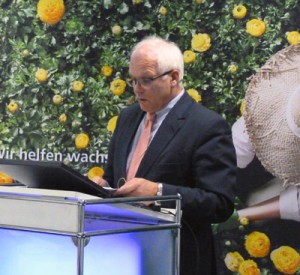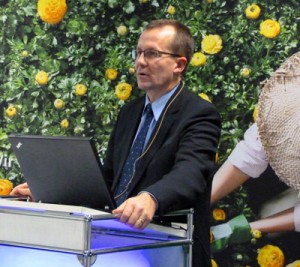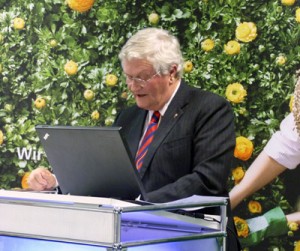EISA-Workshop during International Green Week in Berlin, Germany

Parlamentary Secretary of State, Peter Bleser, of the German Federal Ministry for Food, Agriculture and Consumer protection explains the German “Charta for Agriculture and Consumers”
Berlin, 27 January 2012:The workshop “Building public trust and understanding of farming and food – what more needs to be done?” took place on the EventFarm (ErlebnisBauernhof, fair hall 3.2) of International Green Week in Berlin on 26 January. Following an invitation by EISA, the European Initiative for Sustainable Development in Agriculture, representatives of agricultural organisations from Germany, England, France, Luxembourg, Austria and Sweden presented and discussed how successful agricultural PR can be set up. The Parliamentary Secretary of
State of the German Federal Ministry for Food, Agriculture and Consumer Protection, Peter Bleser, and Pekka Pesonen, Secretary General of COPA-COGECA, the united voice of European farmers and their cooperatives, participated in the event.
Vice-chairman Heinrich Kemper of EISA summarized the central statements of the discussion: “Agriculture must be careful not to present itself in the light of glorified romanticism. Otherwise, the gap will grow between reality and the images in the heads of consumers. Our business must not be ashamed to be modern and innovative. The opposite is true, as being modern and innovative must be communicated again and again, openly and with pride“.

Pekka Pesonen, secretary general of COPA-COGECA, highlights why agricultural communication with the public is so important.
Heinrich Kemper identified the following conclusions from the workshop:
- Communication of the agricultural business can only be successful when as many partners as possible act together. Secondly, platforms and joint projects such as the ErlebnisBauernhof of International Green Week or visits of the “Erlebnis: Bauernhof mobile“ in bigger cities must be established and must be used to communicate with factual information as well as emotions. Just passing on drydata and unemotional facts will not be enough to reach consumers successfully.
- On the one hand, farmers have to try to keep up with technological innovations such as precision farming for example, but on the other hand they must try to make these developments and innovations transparent and plausible to consumers.
Finally, Kemper pointed out the importance of Integrated Farming as a holistic guideline: “If we want to feed more and more humans on this planet with the restricted resources which we have, we will need an intelligent agriculture. We will need to „set out for Green Growth“ – the motto of this year’s ErlebnisBauernhof – where this workshop is taking place, and we will definitely need progress through sustainable innovation!“

Tony Worth, chairman of EISA, explains the EISA Integrated Farming Framework as guideline for intelligent agriculture
The ErlebnisBauernhof in fair hall 3.2 of International Green Week is a joint project of Deutscher Bauernverband (DBV – German Farmers Union), the association information.medien.agrar (i.m.a – information, media, agriculture) and FNL (Fördergemeinschaft Nachhaltige Landwirtschaft – Association for the Promotion of Sustainable Agriculture), with FNL acting as responsible coordinator of the ErlebnisBauernhof. More than 50 other partners are involved as well. The Landwirtschaftliche Rentenbank supports the ErlebnisBauernhof, and agrarheute.com is the official media partner. Light, sound and video systems of the ErlebnisBauernhof are supported by audio+frames Veranstaltungstechnik GmbH. More information is accessible via http://www.fnl-erlebnisbauernhof.de.
media contact:
coordination office ErlebnisBauernhof
c/o Fördergemeinschaft Nachhaltige Landwirtschaft e.V. (FNL)
Simon Michel-Berger
press spokesperson FNL
tel.: 030 8866355-40, fax: 030 8866355-90
s.michel-berger@fnl.de

 Download this page in PDF format
Download this page in PDF format